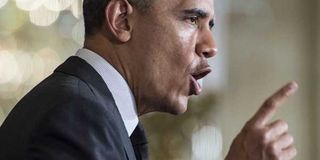US questions Kenya’s resolve to fight terror

US President Barack Obama speaks during an event in the East Room of the White House April 30, 2014 in Washington, DC. PHOTO/AFP
What you need to know:
- Kenya has many deficiencies including adequately criminalising terrorist financing
- the September 2013 al Shabaab attack on Nairobi’s Westgate Shopping Mall focused the world’s attention on Kenya and Kenyan counterterrorism efforts
- The report also blames overt political interference, poor coordination and general lack of preparedness by the Kenyan Security organs as some of the key impediments hampering efforts to root out terrorism
Endemic corruption, limited resources and insufficient training of Kenyan security forces are to blame for the escalation of cases of terrorism in Kenya, the United States government has said.
In a lengthy counter-terrorism annual report released Wednesday by the Department of State in Washington DC, the Barack Obama-led administration also cited lack of meaningful engagement on the part of the Kenyan government to address radicalisation and extremism.
It states that the September 2013 al Shabaab attack on Nairobi’s Westgate Shopping Mall focused the world’s attention on Kenya and her counterterrorism efforts, highlighting significant shortcomings in the Kenyan security forces’ response.
The report lauds Kenya for being a member of the Partnership for Regional East Africa Counterterrorism and describes her as a strong ally of the United States in the fight against al Shabaab and al Qaida but questioned President Uhuru Kenyatta’s commitment to the resolve.
“In October, Mr Kenyatta announced his intention to appoint a commission of inquiry into Westgate “lapses and how we can avoid them in the future,” but no such report had been released publicly by year’s end,” it states.
The Bureau of Counter-terrorism says Kenya has many deficiencies including adequately criminalising terrorist financing, ensuring a fully operational and effectively functioning financial intelligence unit, establishing and implementing an adequate legal framework for the identification and freezing of terrorist assets and implementing an adequate and effective supervisory program for all financial sectors.
It says that although the National Assembly passed the 2013 Finance Act containing amendments to the 2012 Prevention of Terrorism Act, the country should continue to work on implementing its action plan to address deficiencies in legislation, operational effectiveness, asset identification and freezing and financial sector supervision.
“Some Kenyan civil society organisations actively worked to address the drivers of radicalisation and violent extremism in Kenya, often with assistance from the United States and other international partners, but the Government of Kenya was not engaged in significant efforts in such areas,” says the detailed report.
The report also blames overt political interference, poor coordination and general lack of preparedness by the Kenyan Security organs as some of the key impediments hampering efforts to root out terrorism in the region.
“Operational effectiveness was sometimes impeded by poor coordination among and within police, intelligence, and military forces as well as lack of clear chain of command, control and overt political interference,” it stated.
The dossier titled “Country Reports on Terrorism” takes a critical look at the role played by hundreds of countries across the world in either perpetuating or countering terror activities.
Several African countries are reviewed including Djibouti, Ethiopia, Somalia, Burkina Faso, Democratic Republic of Congo (DRC) and Chad.
The report has some kind words for the Kenyan judicial system but not without a caveat.
“The Kenyan judiciary demonstrated increasing independence and competence, but remained hampered by a lack of key procedural tools to allow effective use of plea agreements, cooperation agreements, electronic evidence and other undercover investigative tools.”
It however notes that as a partner on the war on terror, Kenya has made significant progress in the area of terrorist watch-lists, biographic and biometric screening.
“Other measures are in place at major ports of entry as Kenya continues her partnership with the United States to strengthen Personal Identification Secure Comparison and Evaluation System border controls at major ports of entry, including expanded automatic data transmission capability at frequently visited sites.”
It praises Kenya’s primary contribution to supporting counterterrorism capacity building in other nations was its significant troop contribution to AMISOM.
“In addition, Kenya hosted numerous trainings involving law enforcement professionals from neighboring nations to build counterterrorism capacities and increase regional cooperation” it says.Despite the challenges, Kenyan police, intelligence, and military agencies regularly detected and disrupted terrorist threats large and small, adds the report.
The Department of State’s annual report is a statutorily mandated assessment of trends and events in international terrorism, including country-by-country breakdowns of foreign government counterterrorism cooperation and profiles of known foreign terrorist organizations.





